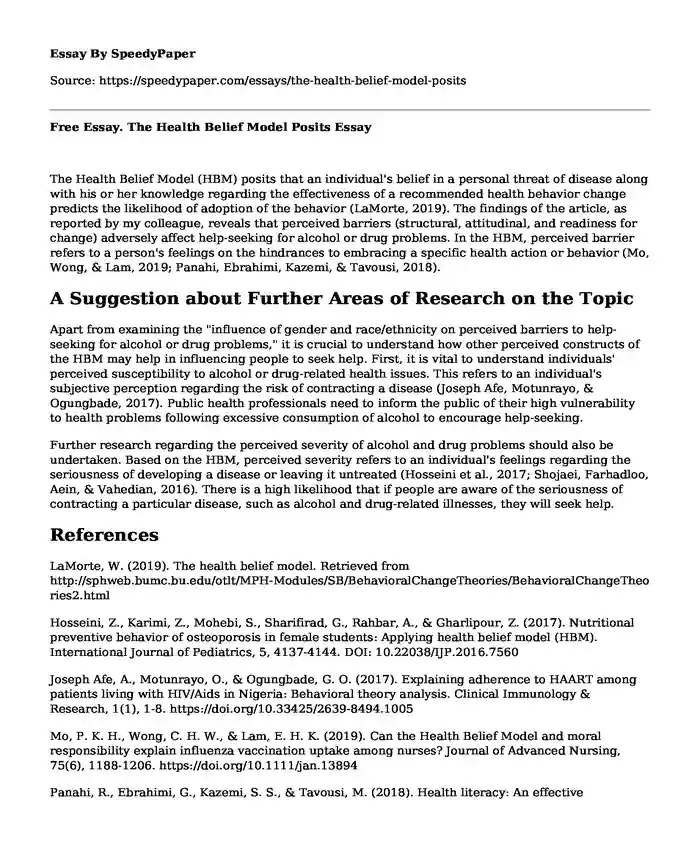
| Type of paper: | Research paper |
| Categories: | Religion Healthcare Human behavior Social issue |
| Pages: | 2 |
| Wordcount: | 479 words |
The Health Belief Model (HBM) posits that an individual's belief in a personal threat of disease along with his or her knowledge regarding the effectiveness of a recommended health behavior change predicts the likelihood of adoption of the behavior (LaMorte, 2019). The findings of the article, as reported by my colleague, reveals that perceived barriers (structural, attitudinal, and readiness for change) adversely affect help-seeking for alcohol or drug problems. In the HBM, perceived barrier refers to a person's feelings on the hindrances to embracing a specific health action or behavior (Mo, Wong, & Lam, 2019; Panahi, Ebrahimi, Kazemi, & Tavousi, 2018).
A Suggestion about Further Areas of Research on the Topic
Apart from examining the "influence of gender and race/ethnicity on perceived barriers to help-seeking for alcohol or drug problems," it is crucial to understand how other perceived constructs of the HBM may help in influencing people to seek help. First, it is vital to understand individuals' perceived susceptibility to alcohol or drug-related health issues. This refers to an individual's subjective perception regarding the risk of contracting a disease (Joseph Afe, Motunrayo, & Ogungbade, 2017). Public health professionals need to inform the public of their high vulnerability to health problems following excessive consumption of alcohol to encourage help-seeking.
Further research regarding the perceived severity of alcohol and drug problems should also be undertaken. Based on the HBM, perceived severity refers to an individual's feelings regarding the seriousness of developing a disease or leaving it untreated (Hosseini et al., 2017; Shojaei, Farhadloo, Aein, & Vahedian, 2016). There is a high likelihood that if people are aware of the seriousness of contracting a particular disease, such as alcohol and drug-related illnesses, they will seek help.
References
LaMorte, W. (2019). The health belief model. Retrieved from http://sphweb.bumc.bu.edu/otlt/MPH-Modules/SB/BehavioralChangeTheories/BehavioralChangeTheories2.html
Hosseini, Z., Karimi, Z., Mohebi, S., Sharifirad, G., Rahbar, A., & Gharlipour, Z. (2017). Nutritional preventive behavior of osteoporosis in female students: Applying health belief model (HBM). International Journal of Pediatrics, 5, 4137-4144. DOI: 10.22038/IJP.2016.7560
Joseph Afe, A., Motunrayo, O., & Ogungbade, G. O. (2017). Explaining adherence to HAART among patients living with HIV/Aids in Nigeria: Behavioral theory analysis. Clinical Immunology & Research, 1(1), 1-8. https://doi.org/10.33425/2639-8494.1005
Mo, P. K. H., Wong, C. H. W., & Lam, E. H. K. (2019). Can the Health Belief Model and moral responsibility explain influenza vaccination uptake among nurses? Journal of Advanced Nursing, 75(6), 1188-1206. https://doi.org/10.1111/jan.13894
Panahi, R., Ebrahimi, G., Kazemi, S. S., & Tavousi, M. (2018). Health literacy: An effective component to overcome perceived barriers to adoption of preventive behaviors in the health belief model. J Educ Community Health, 5(3), 1-3. https://doi.org/10.21859/jech.5.3.1
Shojaei, S., Farhadloo, R., Aein, A., & Vahedian, M. (2016). Effects of the health belief model (HBM)-based educational program on the nutritional knowledge and behaviors of CABG patients. The Journal of Tehran University Heart Center, 11(4), 181-186. https://doi.org/10.2147/PPA.S166523
Cite this page
Free Essay. The Health Belief Model Posits. (2023, Mar 27). Retrieved from https://speedypaper.net/essays/the-health-belief-model-posits
Request Removal
If you are the original author of this essay and no longer wish to have it published on the SpeedyPaper website, please click below to request its removal:
- Capital Punishment Essay Example
- Free Essay on Crown Company Worldwide
- Essay Sample: Byzantine Ambassadors as Related by Ibn Al-Khatib
- Transfer Application Essay Sample
- Deploy and Administer Windows Server 2012
- Free Essay Dedicated to Industrialization in England
- What on Earth Am I Here For - Essay Sample
Popular categories




